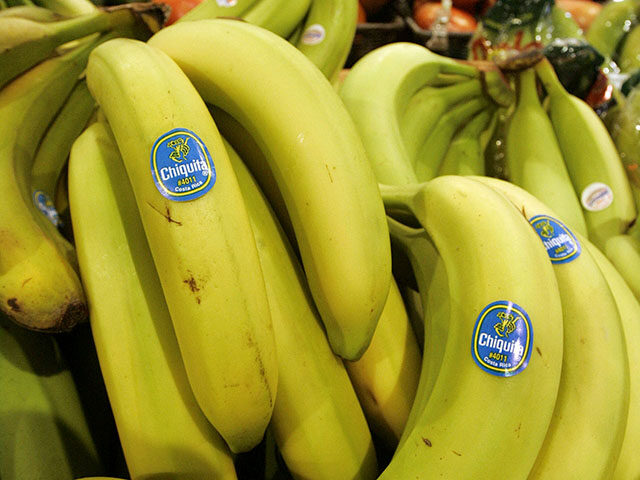Chiquita Brands, the famous banana company, was ordered by a federal jury on Wednesday to pay $38.3 million to the family members of people killed by the United Self-Defense Forces of Colombia (AUC), a paramilitary group it funded during the 1990s and early 2000s.
“This verdict sends a powerful message to corporations everywhere: profiting from human rights abuses will not go unpunished,” said plaintiff’s lawyer Marco Simons, general counsel for a human rights and environmentalist nonprofit called EarthRights International.
“These families, victimized by armed groups and corporations, asserted their power and prevailed in the judicial process,” Simons said.
“The verdict does not bring back the husbands and sons who were killed, but it sets the record straight and places accountability for funding terrorism where it belongs: at Chiquita’s doorstep,” said Agnieszka Fryszman, another plaintiff’s lawyer.
Chiquita issued a statement calling the Colombian civil war “tragic for so many,” but insisted there is “no legal basis” for the claims filed against it.
The most recent of Columbia’s many civil wars broke out in 1964 and formally ended with a truce in 2016. The primary antagonist was a communist insurgent group called the Revolutionary Armed Forces of Colombia – which, like the AUC, is more commonly known by its Spanish acronym, FARC. While the FARC claimed to “disband” as a result of the 2016 peace agreement, it continues to pose a significant threat to Colombia and its neighbors through widespread recruitment of children, including on the Chinese social media app Tiktok.
The long struggle is often described as a “low-intensity” conflict, although it felt pretty intense to the roughly 220,000 people killed over the span of a half-century. Other left-wing militant groups allied with FARC during the conflict, while right-wing militias lined up against them.
All of these groups did terrible things, including drug trafficking, racketeering, kidnapping, and murder (the FARC and another major left-wing militia, the National Liberation Army (ELN), continue to do so). Many of the Colombian paramilitaries, including both FARC and the AUC, were designated as foreign terrorist organizations by the U.S. government.
As its name implies, the AUC was ostensibly founded as a self-defense organization, a coalition of vigilante groups that took arms to protect landowners from theft and kidnapping by left-wing guerrillas.
The AUC was originally opposed to drug cartels as well, but later began doing business with them. As its manpower swelled to some 30,000 fighters at its peak, the AUC began looking less like a volunteer counterinsurgency vigilante operation, and more like a violent gangster organization.
This was the state of affairs when the AUC became entangled with Banadex, the Colombian subsidiary of Chiquita. During the trial in Florida, Chiquita said the roughly $1.7 million paid to AUC by Banadex between 1997 and 2004 was essentially protection money, handed over to prevent the AUC from interfering with the company’s operations.
Chiquita said its employees and managers were threatened by paramilitary units, both the AUC and others, and forced to make protection payments. The company suggested some of the victims represented at the trial might have been killed by other militias besides AUC, as several were active in the Uraba farmland region at the time.
Chiquita pled guilty in 2007 before a D.C. court to making payments to the AUC, a federal crime given that the group was classified as a foreign terrorist organization in 2001. The company was slapped with a $25 million fine and ordered to cooperate with further investigations.
The Department of Justice (DOJ) noted at the time that Chiquita’s hundred-plus payments, passed along to the paramilitary group through intermediaries, were entered in its ledgers as “security services.” However, DOJ also said Chiquita began making these payments after the leader of the AUC, Carlos Castano, threatened “physical harm to Banadex personnel and property” in 1997.
The civil action against Chiquita was initially filed in 2008. Lawyers for the 16 families that sued Chiquita claimed the Colombian subsidiary used the AUC as hired muscle to ruthlessly terrorize farmers, forcing them to sell fertile land to Banadex at cut-rate prices.
A similar case is pending against Chiquita in the Colombian city of Medellín and other companies have been accused of collusion with paramilitary groups. Human rights activists complain the corporations have enough money and political clout to escape judgment in Colombian courts. Until now, it has been very unusual for a corporation to face liability in American courts for actions taken on foreign soil.
Colombia’s left-wing President Gustavo Petro reacted to the Florida judgment on social media by urging Colombian courts to go after Chiquita as well.
“Why could the U.S. justice system determine in judicial truth that Chiquita Brands financed paramilitarism in Uraba? Why couldn’t Colombian justice?” Petro asked.
“If the 2016 peace agreement, which we already know is a unilateral state declaration that commits us to the world, speaks of a single court to establish judicial truth, why don’t we have it?” he said, referring to the truce that concluded the Colombian civil war.

COMMENTS
Please let us know if you're having issues with commenting.